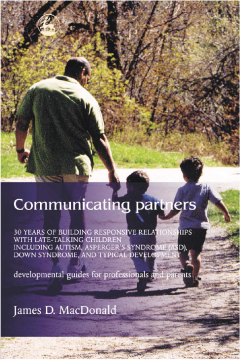
Additional Information
Book Details
Abstract
Communicating Partners, the result of over thirty years of clinical practice and research work with pre-verbal and verbal children with language delays, offers an innovative approach to working with late talking children that focuses on developing relationships through mutual understanding. Providing detailed maps of what children and their life partners need to do to ensure effective social relationships, the program focuses on five key stages of communication development - interactive play, nonverbal communication, social language, conversation, and civil behavior - and five life-long responsive strategies to use every day to build relationships within the child's own world. Communicating Partners addresses issues such as:
* What does a child need to do before language?
* What are effective ways to help a child socialize and communicate from early play through civil conversations?
* How have parents successfully helped children learn to communicate at home?
* How can a child develop socially effective language and conversation skills?
* How can a child with an autistic spectrum disorder, Down Syndrome or other significant delays develop rich social relationships?
* What have families done to build warm social relationships with their children?
* What is developmentally effective therapy and education when social and communicative delays are of major concern?
Illustrated with personal stories and research findings, and containing a wealth of practical suggestions to help parents, teachers, and professionals understand their child's world, Communicating Partners is an invaluable resource for all those interacting and working with late talking children.
James MacDonald's book is based on over 30 years of research and clinical work at Ohio State University. Communicating Partners is an optimistic approach to working with children with communication disorders. It challenges practitioners to think beyond traditional therapy programmes and focus more on language learning in naturalistic environments and developing strengths through positive social relationships. MacDonald encourages practitioners and parents to consider the power of child-led play and advocates the theory that only once you enter into the child's world will you have the slightest chance of teaching them something new. Communicating Partners is a useful resource for professionals working with children with language and social communication difficulties and would also be of interest to parents.
Early Talk Newsletter
The book offers speech and language professionals a model to guide their therapy plans, but emphasizes the need for therapy to be generalized to daily life. Accordingly it emphasizes the need for parents and professionals to become partners in helping the child, stressing that children best develop social interaction skills within the family. Numerous anecdotes are included to illustrate how this approach has helped a wide variety of children and their families. This book would be of particular benefit to the parents/carers of children who are late to develop language for any reason, since it provides simple ideas to help stimulate social communication by following the child's lead. Professionals working with families may also find it useful to give ideas of where to start remediation and target therapy. Although it is not solely aimed at parents/carers of children on the autistic spectrum, it would probably be of most benefit to this group.
Child Language Teaching and Therapy
The author, who is vastly experienced, presents this child-centred approach clearly, offering students, parents and professionals plenty of background information and practical guidance.
Care and Health Magazine
James D. MacDonald, Ph.D was Professor of Speech and Language Pathology and Developmental Disabilities at Ohio State University. He has written six books and over fifty professional papers on communication development. He currently directs the Communicating Partners Center which provides family therapy, continuing education workshops, school consultations, and an international information network through an internet group.
